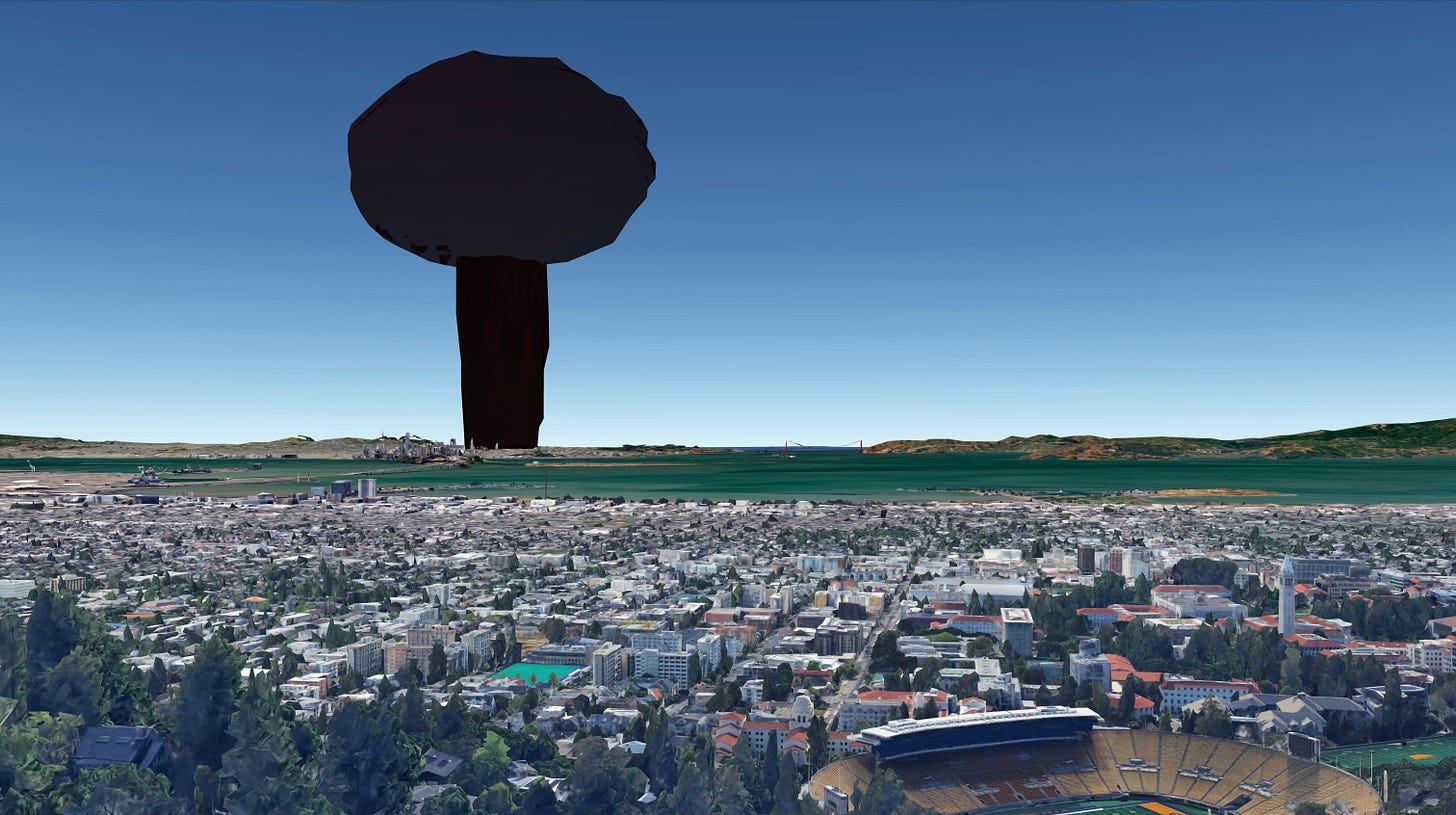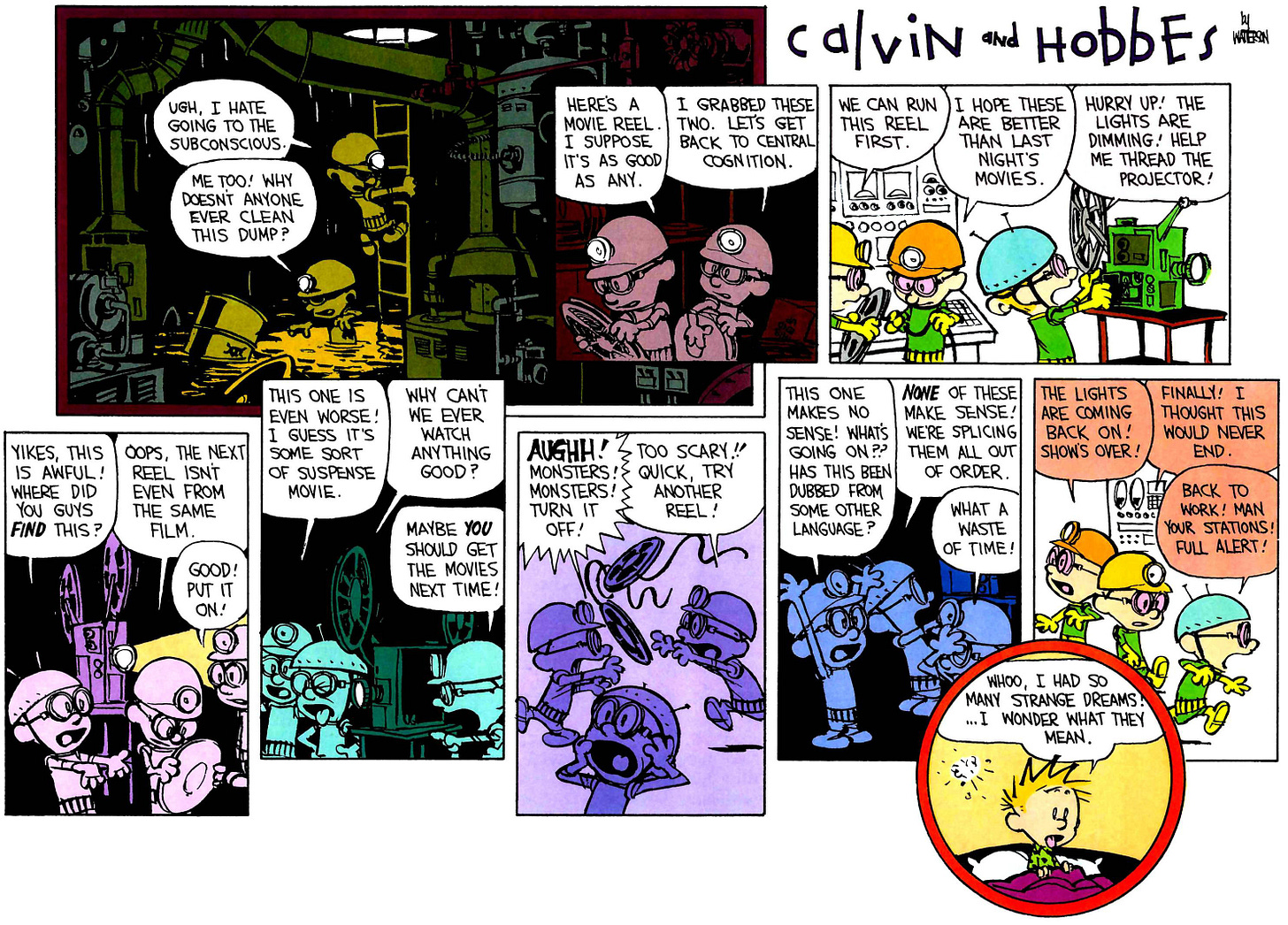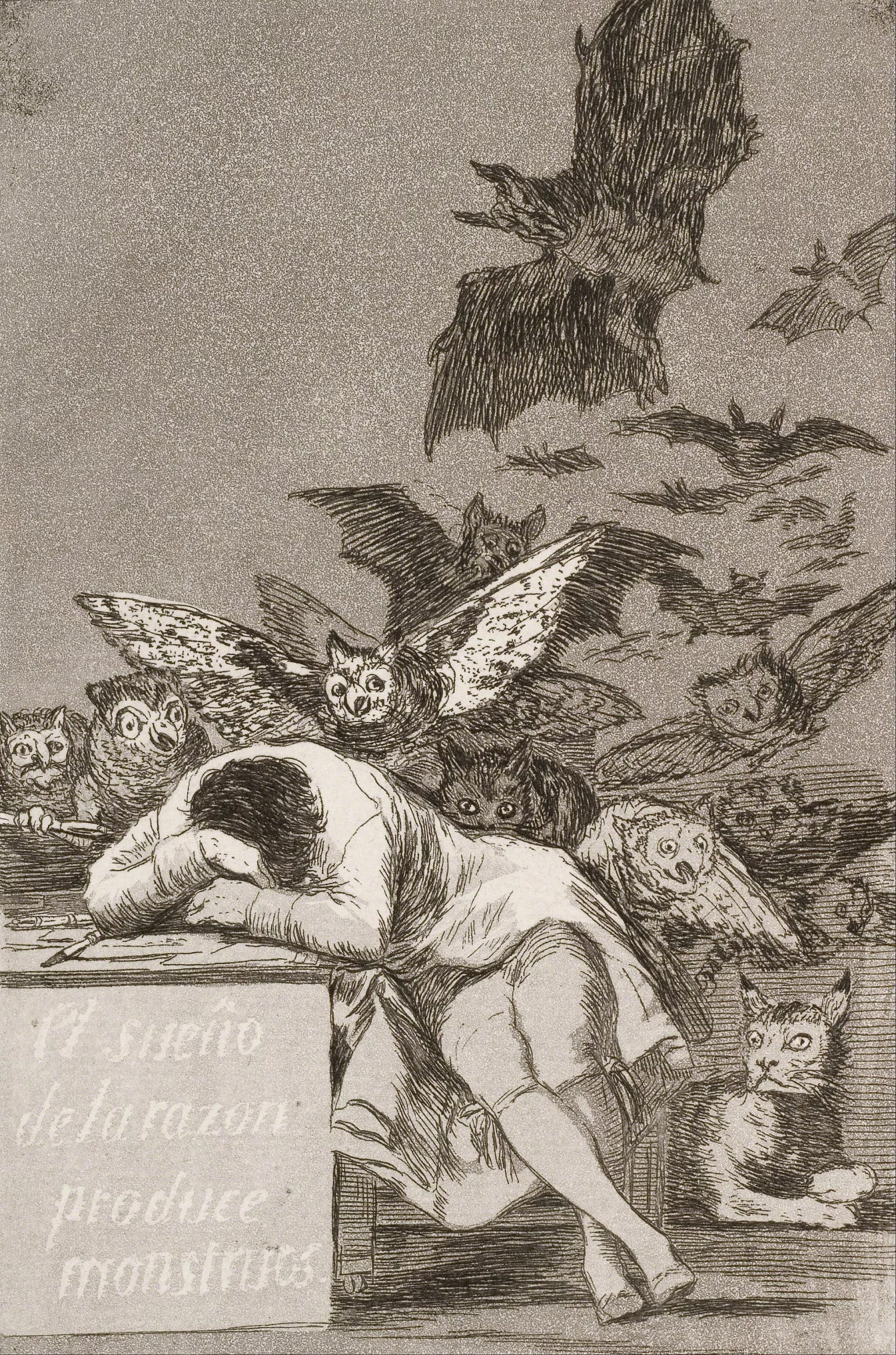What’s in a dream? Some people view them as deeply meaningful reflections of the mind’s internal state, while others see them as essentially white noise that gets over-interpreted by our mental faculties. And some, of course, believe that they are divinely inspired or supernaturally influenced, glimpses into possible futures, or even visions of alternate dimensions. I lean towards the materialistic end of the spectrum — perhaps not “merely” white noise, but not an elaborate attempt by the id to send secret messages to the ego, as Freud had it. But I find dreaming a fascinating experience to have, and enjoy thinking about what my own dreams might or might reveal about how my mind is processing things beneath the surface of my awareness.
Despite spending over 20 years thinking about nuclear weapons pretty much full-time, I have only had two “apocalypse” dreams that I can remember. One of them was not long after the 9/11 attacks, when I was still an undergraduate. At the time I was living in a “mother-in-law” unit attached to a house on a hill above the campus of the University of California, Berkeley. In retrospect, it was a somewhat eccentric and arguably anti-social living situation. It was within walking distance to campus, but the hill was so steep that it made for quite a hike, and the road was so narrow and winding that on the way up, one passed a large sign that warned that if a fire started in the hills, there would be no guarantee that any emergency aid could reach you. But it was intensely beautiful, had a panoramic view of the Bay, and was “natural” enough that deer and hummingbirds would pass by my entrance routinely, and, all-importantly at the time, I had managed to secure a lease on it for a reasonable rent, which was no mean feat even back in the early 2000s (and in retrospect, it feels like an impossible find).1
All of which is to just give some context to the dream, the climax of which I still remember vividly, in which I walk out of my little apartment, look across the Bay, and see a blood-red mushroom cloud rising over the city of San Francisco. And shortly after, I woke up.

Then and now, the “meaning” of the dream seemed pretty clear to me: clearly that sense of vulnerability that was created by 9/11 had seeped into my subconscious pretty deeply. This was during that early period after 9/11 when it still wasn’t clear if it was the beginning of something that was going to escalate or repeat, and when one felt that any large-enough city or landmark could be a target.
The other dream was more recent, only several months ago. In this dream, some kind of hellish disaster was unfolding. In retrospect, the dream seems like it was set in “dream San Francisco,” an impressionistic version of San Francisco that I sometimes dream about,2 and I was inside some sort of large building with many other people. It wasn’t at first clear what the disaster was: perhaps a massive earthquake, or some kind of nuclear detonation, or some other kind of massive attack. At this point in my life, I have been far more steeped in disaster response literature than I was during my first dream, so I had some idea of what I was “meant to do,” and, like the hero I sometimes dream myself to be, I was trying to help other people by giving instructions. So I was directing people towards what felt to me like safer places to hunker down and wait it out.
But then, at some point, it became clear to me that this was not any kind of normal disaster, but it was really some kind of extraterrestrial attack. Massive “spikes” were jutting out of the ground, destroying building in their wake, as explosions were going off all over the place and who-knows-what was raining down from the heavens. And I remember thinking, “well, I truly don’t have any guidance for what you’re supposed to do in this situation!” And then woke up.3
And while I’m not reading too much into that dream, I did think it was somewhat amusing. “Oh,” my dream conductor seemed to say, “you think you know what to do in the event of a major disaster? Well, what about THIS? What now, smart guy?”4 Fair enough!
Dreaming about doomsday is hardly a new thing. Lord Byron’s post-apocalyptic poem “Darkness” (1816) opens with the evocative line: “I had a dream, which was not all a dream.” Dreaming about apocalypses is so common that there is a small psychological literature on the subject. Mortimer Ostow, in his “The Interpretation of Apocalyptic Dreams” (1992), for example, discusses the idea (derived from Freud) that apocalypses are fundamentally “death and rebirth fantasies,” and suggests there is an “apocalypse pattern” to dreams that could be considered a clinical category of analysis.5
I don’t personally find Freudian dream analysis very compelling, especially when they get into specifics, but I do think there’s something to the idea that these kinds of themes are pretty well-ingrained in human culture and thus human minds, and so it’s not surprising that they show up the way they do. It’s not that radical of an idea that whatever the “grant anxiety” of your particular culture, that it would show up as a possible source of imagery in one’s own anxiety dreams.
One of the current systems in Oregon Road ‘83, the post-apocalyptic video game I have been working on with students for several years, is a “resting” system. The idea is that one cannot stay awake indefinitely, and must take some specific time to sleep. From a gameplay perspective, this introduces another factor of things to “keep track of,” hopefully not in an overwhelming way, and adds “stakes” to deciding when and where to rest, as some places may be better than others. Failing to rest can result in falling asleep at random while driving, which is a bad thing. And while sleeping, things could happen to you: you might wake up and find you have been robbed, as one unpleasant possibility.
Programming this system was not very difficult — it’s just a matter of keeping track of how many hours since you last slept, and coming up with a suitable model for how much sleep a person needs. When you have extended “over” your threshold time for being tired, there is basically a function which determines the odds that you could fall asleep at random; it is exponential in nature, so the odds start out quite low but after a certain amount of time, the chance of mishap approaches 100%.
But a message that simple says, “you are asleep” is not very compelling, by itself! So of course I felt the need to jazz it up a bit, with a little “eyelid” overlay that would close over the whole scene. And then, once that happens… what else? Well, of course, I thought, the player ought to dream.
But dream of what? Well, anyway. In the game, your character has survived a great disaster. Perhaps they will dream about that? Perhaps they will dream of the time before the war? Perhaps they will dream of those lost and gone? Perhaps they will dream of long-lost pets? Perhaps they will dream the kind of nonsense dreams that we all dream?
And so, in one of its most minor systems, there is a “Dream System” within Oregon Road ‘83, in which catalogues of dreams are kept in a small database (the evocatively named “dream pool”), and there is a small chance of any one of them being retrieved at any given time. It started as a very simple system, of course, but in the way of these things, it was built out somewhat. You can see a version of it in action above. Each “dream” generally consists of a short sentence or two, but it could be as complicated as one wants. Other events can add dreams to the “dream pool” (so one might dream of a narrow escape some time later), and one can have a recurrent dream that changes over time (the game keeps track of what dreams have been dreamed, so they can reference each other). The dreams do nothing more than contribute to the narrative (a bad or good dream cannot help or hurt you), although one can imagine using dreams as ways to act as unconscious signals (e.g., if you have recruited someone untrustworthy, perhaps that fact is revealed in a dream).
I’ve tried to keep all of the dreams in the game so far short and deliberately gnomic. It is well-known that most people find the dreams of other people uninteresting, and in the case of the game, I don’t want to “over-attribute” too much to the player character’s thoughts and backgrounds (so that the human player can “fill in the gaps” with whatever makes sense to them). But I’m also open to the idea that longer, more specific dreams might be interesting as part of the world-building experience.
What do you think you would dream about, if you were the survivor of an apocalypse? If you would like to actually contribute a dream idea to the game, I’ve made a little Google Form for just that purpose. All dream ideas will be read — they may or may not be used (or inspirations for other ideas). If you submit an idea, you are offering it up willingly and free, without expectation of authorship, ownership, or credit (but if I can, and if you want, I may find a way to credit you).
As I think the above makes a bit clear, I find dreams a very rich part of my life, even if I don’t attribute to them a lot of objective meaning. I find it a little interesting that I haven’t remembered more than two apocalyptic dreams (much less any truly post-apocalyptic ones), despite ingesting more than the usual amount of such things over the years. But perhaps that’s for the best…
The story of how I got the place is somewhat parenthetical, but amusing. I was working at a campus job at the university at the time. Searching for housing the East Bay was a nightmare (and has gotten worse over time, I gather), and involved taking a packet of all of your financial and personal data (credit history, a “resume” of past rentals, etc.) to innumerable “open houses” found on Craigslist, hoping beyond hope that the landlord would think that a college student would be a better tenant than the literally dozens and dozens of other people who applied to live there. Which of course was not all that likely to begin with.
This particular place was on a street that had the same name as another street in the city of Berkeley, a well-known one, and so I had assumed it would just be a few blocks away from campus. In reality, because it was so far up the hill, the street in town “stopped” at the edge of the hill and then “restarted” further up it, so it was much farther away than I realized. (I think this was in the days of MapQuest.) So I realized this late and subsequently arrived to the open house (from my campus job) late. There were lots of people there who wanted the two units that were on offer, and I was pretty sure I was not going to get them, so I gave my packet to the renting agent and prepared for the walk back to work. She looked at it, and said to me: “Hmm, this looks good, but I also need your birthdate.” “Sure, but why?” I asked. “Because I use astrology to figure out who to rent to,” she explained, straight-faced.
On the walk back to work, I thought, wow, what a Berkeley experience. And what a lousy system for determining your tenants. But on the other hand, from my perspective as an applicant, the more rational systems were clearly not in my favor — a college kid is probably a riskier tenant than a professional — so maybe an irrational one might work out? I didn’t know what level of astrology they practiced, but I figured, what, is that a 1-in-12 chance? Not too bad, maybe.
Anyway, she called me back the next day and told me that the stars had literally aligned in my favor and that I could rent the place. I lived there for my junior and senior years.
Years later, I was telling this story to another Berkeley alum, and they were shocked because they had the exact same experience happen to them — and we worked out that it was the same rental agent.
I have a number of “dream cities” that recur in my dreams — pretty much never the city I am ever currently living in, for whatever reason. “Dream San Francisco” and “Dream Berkeley” are two places I have dreamed about multiple times. “Dream Berkeley” is basically based on one part of one actual street in Berkeley (not one I ever spent much time on, oddly enough), which is expanded impossibly larger than it it is in real life. I find this kind of “dream geography” and “dream architecture” interesting, although I do not really know what it reveals about dreaming, memory, the mind, etc.
A few weeks after the dream, I saw the trailer for the new Quiet Place prequel, and was struck by the ways in which it resembled my dream. But the dream, in some ways, also resembled the final attack Avengers: Endgame. So, who knows?
If this sounds like I have an antagonistic relationship with whatever part of my mind seems to generate dreams — I do. And I think of it in this way, as this “external” force. It does at times seem sadistic. When I was still a child, I had a dream in which I died (as one does), but in this one, I did not wake up from it for an amount of time that felt very long. Instead I sat there, in the dream, in total darkness and kept thinking, “OK… time to wake up… any moment now.” Eventually I did wake up. But really, mind. What are we doing here.
Mortimer Ostow, “The Interpretation of Apocalyptic Dreams,” Dreaming, 2, no. 1 (1992), 1-14.




Regarding "Darkness", Lord Byron HAD experienced a somewhat apocalyptic event then: the 1816 Year Without a Summer, a volcanic winter from a major eruption the year before (Mt Tambora 1815 in Indonesia). Crops failed all over eastern North America and western Europe due to cold and/or wet weather, monsoons were disrupted and late in India and southeast Asia, China had major floods on the Yangtze River system, Brazil had a major drought, and different parts of tropical Africa had significantly wetter or drier weather than usual.
And in Switzerland, Lord Byron, Percy Bysshe Shelley and Mary Shelley, John William Polidori, and some of their friends had rented a villa for the summer. But continual cold and wet weather kept them indoors, and inspired storytelling among these creative people. Not only did Byron's "Darkness" come out of it, but so did much of Mary Shelley's _Frankenstein_ (especially the chases through cold and mists in the Arctic), and a Lord Byron "Fragment" that later inspired Polidori's _The Vampyre_.
A couple of years ago, when I just started getting into "nuclear studies", I had a dream where we had to be evacuated from my city because a nuclear attack was expected within a few hours. Lined up in traffic with my family with fighter jets whizzing overhead, it was a fairly realistic setting. The weird thing is that the attack wasn't actually expected in my city (Mexicali, Mexico, next to El Centro), but in LA or San Diego. Also, I consider it a nightmare because we weren't allowed to bring our pets!